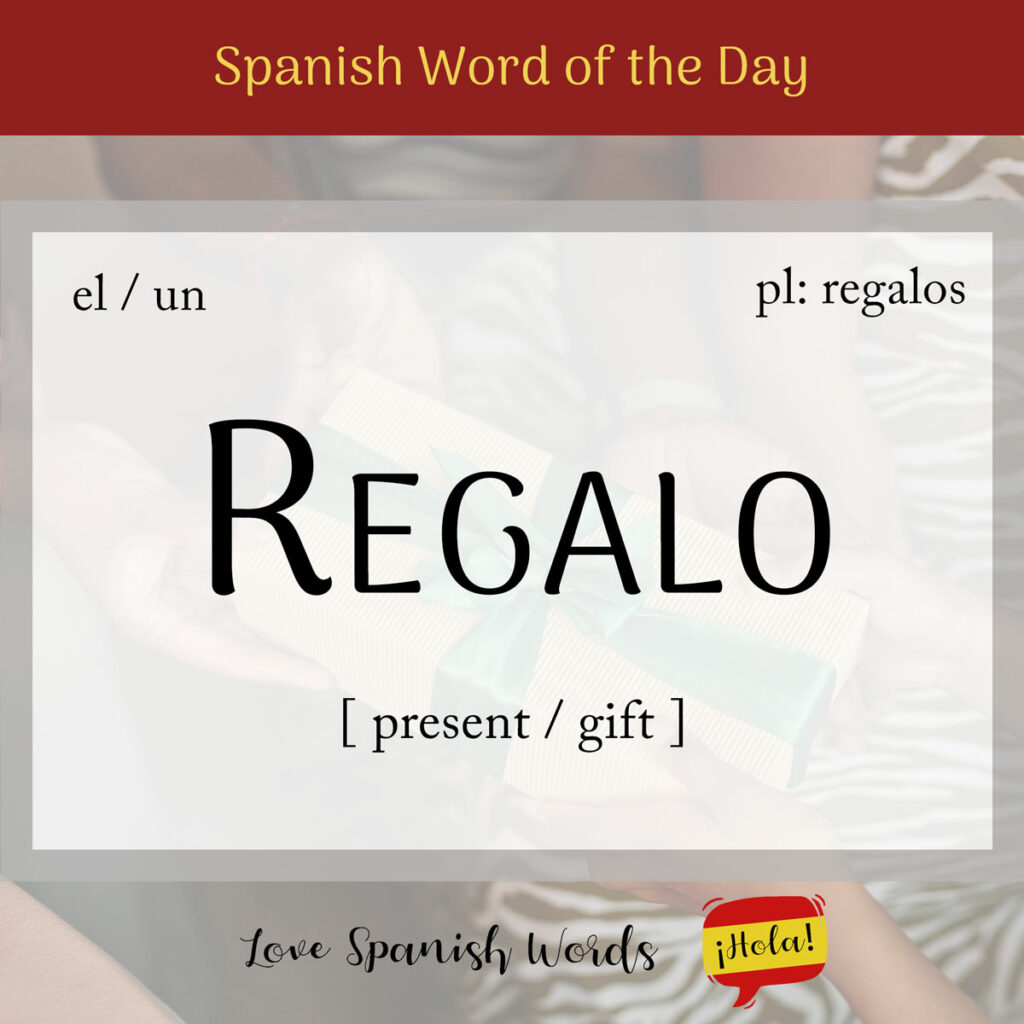Christmas is not all about regalos (gifts), but we cannot deny that they are an important part of this holiday. The word regalo originates from the Old Spanish rigallo, which itself stems from the Old Provençal regal. Both are derived from the Latin regalis, meaning royal or of a king, connected to rex, meaning king. The connection to royalty suggests that regalo originally denoted something splendid or worthy of a monarch, aligning with the idea of a precious gift.
Latin American Pronunciation
European Pronunciation

Regalo is a masculine noun and it uses the following articles:
- el regalo = the gift
- los regalos = the gifts
- un regalo = a gift
- unos regalos = some gifts
In modern Spanish, regalo primarily means gift or present, but it can also refer to a treat, indulgence, or something that brings delight. For example:
- Un regalo de cumpleaños = A birthday gift
- Una cena de regalo = A complimentary dinner
- Es un regalo para los ojos = It’s a treat for the eyes (something visually stunning)
There’s also the verb form, regalar, which means to give a gift or to indulge. here is the conjugation for present, preterite, and future tense:
| Present tense | Preterite tense | Future tense | |
| Yo | regalo | regalé | regalaré |
| Tú | regalas | regalaste | regalarás |
| Él / Ella / Usted | regala | regaló | regalará |
| Nosotros / Nosotras | regalamos | regalamos | regalaremos |
| Vosotros / Vosotras | regaláis | regalasteis | regalaréis |
| Ellos/ Ellas / Ustedes | regalan | regalaron | regalarán |
Se regaló un día de descanso.
He/She treated themselves to a day off.
Something funny happens in Colombia with this verb. Here it’s commonly used as a polite and friendly way to make requests at restaurants, cafés, or stores. Instead of directly asking with dar (to give) or traer (to bring), Colombians say things like ¿Me regala un café, por favor? (Would you gift me a coffee, please?). This phrasing doesn’t imply expecting the item for free but reflects the cultural emphasis on courtesy, making interactions feel warmer and less transactional.
¿Nos regala la cuenta, por favor?
Would you give (gift) us the check, please?
Regalos are central to festive traditions in Hispanic cultures, particularly during Christmas. The concept of aguinaldos—small gifts or bonuses—is widespread in Latin America and Spain:
- Aguinaldo in Puerto Rico: These are traditional Christmas songs or parrandas that neighbors sing, often accompanied by small gifts like food or drink.
- Aguinaldo in Mexico: A holiday bonus typically given to employees in December.
- Aguinaldo in Colombia: A traditional Christmas bonus given to employees or a small gift given between friends and family, often an ancheta (gift basket or hamper), exchanged during the holiday season.
Ya quiero recibir el aguinaldo de la empresa.
I want to receive the company bonus now.
In Spain and many Latin American countries, children also receive regalos on January 6th, the Día de Reyes (Day of the Three Kings), commemorating the gifts of oro (gold), incienso (frankincense), and mirra (myrrh) presented to baby Jesus.
But the word regalo encapsulates more than the act of giving; it reflects the spirit of generosity, celebration, and human connection central to Hispanic culture. Regalo reminds us that tangible and intangible gifts are at the heart of shared joy and gratitude.

Spanish idioms featuring ‘regalo’
A caballo regalado no se le mira el diente
Literal translation: Don’t look at a gifted horse’s teeth.
English meaning: Don’t look a gift horse in the mouth.
Es un regalo caído del cielo
Literal translation: It’s a gift fallen from the sky
English meaning: It’s a godsend
De regalo
Literal translation: As a gift
English meaning: Often used in retail to describe items included for free
Como agua de mayo
Literal translation: Like May rain
English meaning: A welcome gift or blessing

